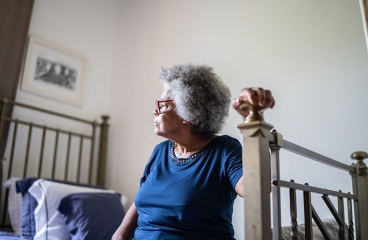
Overview
Orthostatic hypotension is a quick drop in blood pressure. It happens when you get up from sitting or lying down. You may feel faint, lightheaded, or dizzy.
When a person sits up or stands up, the body changes the way it pumps blood. This can slow the flow of blood to the brain for a very short time. And that can make you feel lightheaded.
Many medicines can cause this problem, especially in older people. Lack of fluids (dehydration) or illnesses such as diabetes or heart disease also can cause it.
Follow-up care is a key part of your treatment and safety. Be sure to make and go to all appointments, and call your doctor if you are having problems. It's also a good idea to know your test results and keep a list of the medicines you take.
How can you care for yourself at home?
- Be safe with medicines. Call your doctor if you think you are having a problem with your medicine. You will get more details on the specific medicines your doctor prescribes.
- If you feel dizzy or lightheaded, sit down or lie down for a few minutes. Or you can sit down and put your head between your knees. This will help your blood pressure go back to normal and help your symptoms go away.
- Follow your doctor's suggestions for ways to prevent symptoms like dizziness. These suggestions may include:
- Get up slowly from bed or after sitting for a long time. If you are in bed, roll to your side and swing your legs over the edge of the bed and onto the floor. Push your body up to a sitting position. Wait for a while before you slowly stand up.
- Add more salt to your diet, if your doctor recommends it.
- Drink plenty of fluids. Choose water and other clear liquids. If you have kidney, heart, or liver disease and have to limit fluids, talk with your doctor before you increase the amount of fluids you drink.
- Avoid or limit alcohol to 2 drinks a day for men and 1 drink a day for women. Alcohol may interfere with your medicine. In addition, alcohol can make your low blood pressure worse by causing your body to lose water.
- Wear compression stockings to help improve blood flow.
When should you call for help?
Call 911 anytime you think you may need emergency care. For example, call if:
- You passed out (lost consciousness).
Watch closely for changes in your health, and be sure to contact your doctor if:
- You do not get better as expected.
Where can you learn more?
Go to http://www.healthwise.net/patientEd
Enter V984 in the search box to learn more about "Orthostatic Hypotension: Care Instructions".
Current as of: July 31, 2024
Author: Ignite Healthwise, LLC Staff
Clinical Review Board
All Healthwise education is reviewed by a team that includes physicians, nurses, advanced practitioners, registered dieticians, and other healthcare professionals.

